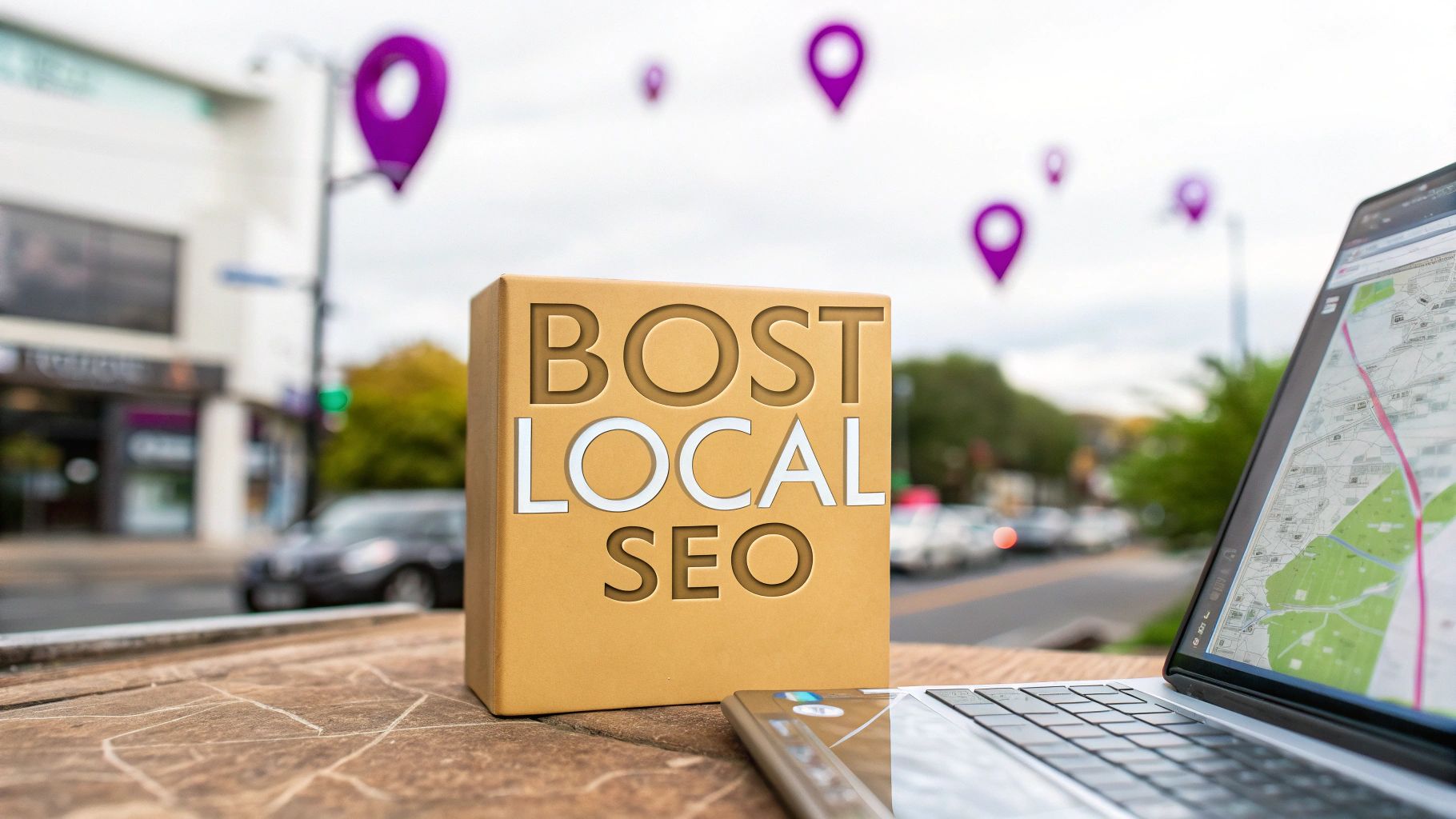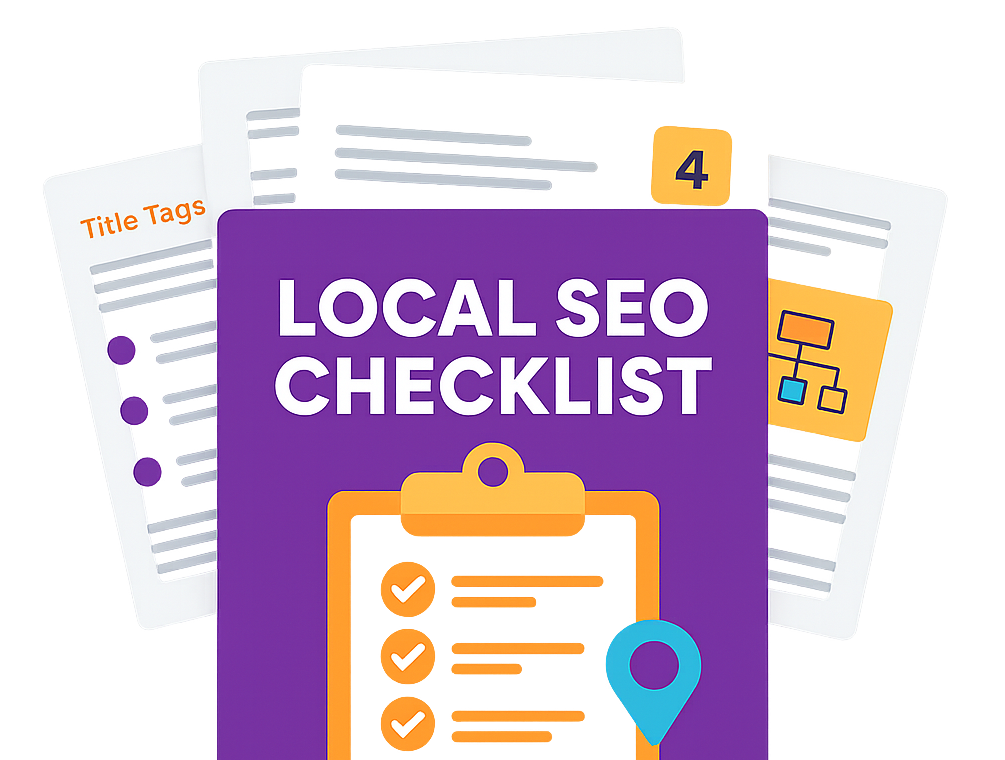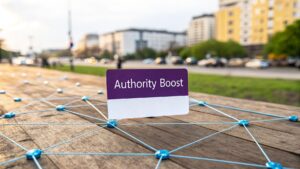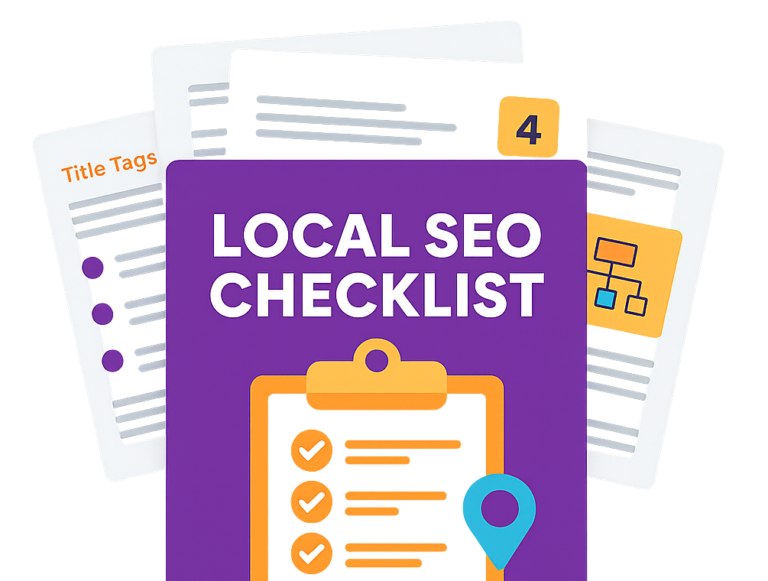Local SEO for franchisees isn't just a marketing buzzword; it's the strategic process of making sure your individual locations pop up in local search results. It’s all about fine-tuning each spot’s Google Business Profile, building out local citations, and creating content that actually speaks to the community you're in.
Done right, it turns those "near me" searches into real-world customers walking through your doors.
Your Foundation: Google Business Profile Optimisation
For any franchisee, mastering the Google Business Profile (GBP) is the absolute cornerstone of local SEO. Think of it as your digital shopfront on Google Search and Maps. For many potential customers, it's the very first interaction they'll have with your local branch.
A fully polished profile does more than just list your address and phone number; it actively pulls in and converts local searchers.
This isn't a set-it-and-forget-it task, especially for a franchise. Each location needs its own unique, carefully managed profile. It has to reflect its specific neighbourhood while staying true to the main brand's standards. This is how you turn a generic listing into a powerful tool for bringing in new business.
Choosing The Right Business Categories
Getting your categories right is probably the single most important part of setting up your GBP. This is how you tell Google exactly what your business does and which searches you should show up for.
Google lets you pick one primary category and a handful of secondary ones. Your primary category needs to be the most specific, accurate description of what you primarily offer.
For instance, a franchisee of "The Great British Bakery" shouldn't just lazily pick "Food." A much better primary category would be "Bakery." Then, for the secondary categories, you can broaden your reach with things like "Cake Shop," "Coffee Shop," or "Sandwich Shop," assuming you offer those. This detail is what helps you appear in a much wider net of local searches.
Crafting a Compelling Business Description
Your business description is your chance to have a real conversation with the local community. Steer clear of just pasting in generic, corporate-approved jargon here. Instead, write something that feels personal and genuinely connected to the area.
Mention a few local landmarks, the specific neighbourhood you're in, or something that makes your franchise location unique. For our bakery example in Manchester, the description could be something like: "Your friendly neighbourhood bakery in the heart of the Northern Quarter, serving freshly baked sourdough, artisan cakes, and locally roasted coffee daily. Perfect for a treat after exploring the nearby Affleck's Palace."
This simple touch makes the franchise feel like it’s part of the community fabric, not just another cookie-cutter chain. You can find more in-depth strategies in our complete guide to Google My Business optimisation.
The Power of Visuals and Engagement
Photos and videos are what bring your franchise location to life online. High-quality, up-to-date images of your shopfront, interior, products, and team are non-negotiable. Want to take it a step further? Geotag your photos before you upload them. This embeds location data right into the image file, giving Google another strong local signal to work with.
Features like Google Posts and the Q&A section are also goldmines for engagement. Use Posts to shout about local promotions, show off a new product, or share news about your community involvement. And be proactive with the Q&A section—load it up with answers to common questions yourself to control the narrative and give people instant info.
An active GBP profile is a trusted profile. Regular updates, fresh photos, and quick responses to questions and reviews all signal to Google that your business is open, engaged, and deserves a better spot in local search results.
This process gives you the foundational steps for any franchisee looking to get started on their local SEO journey.
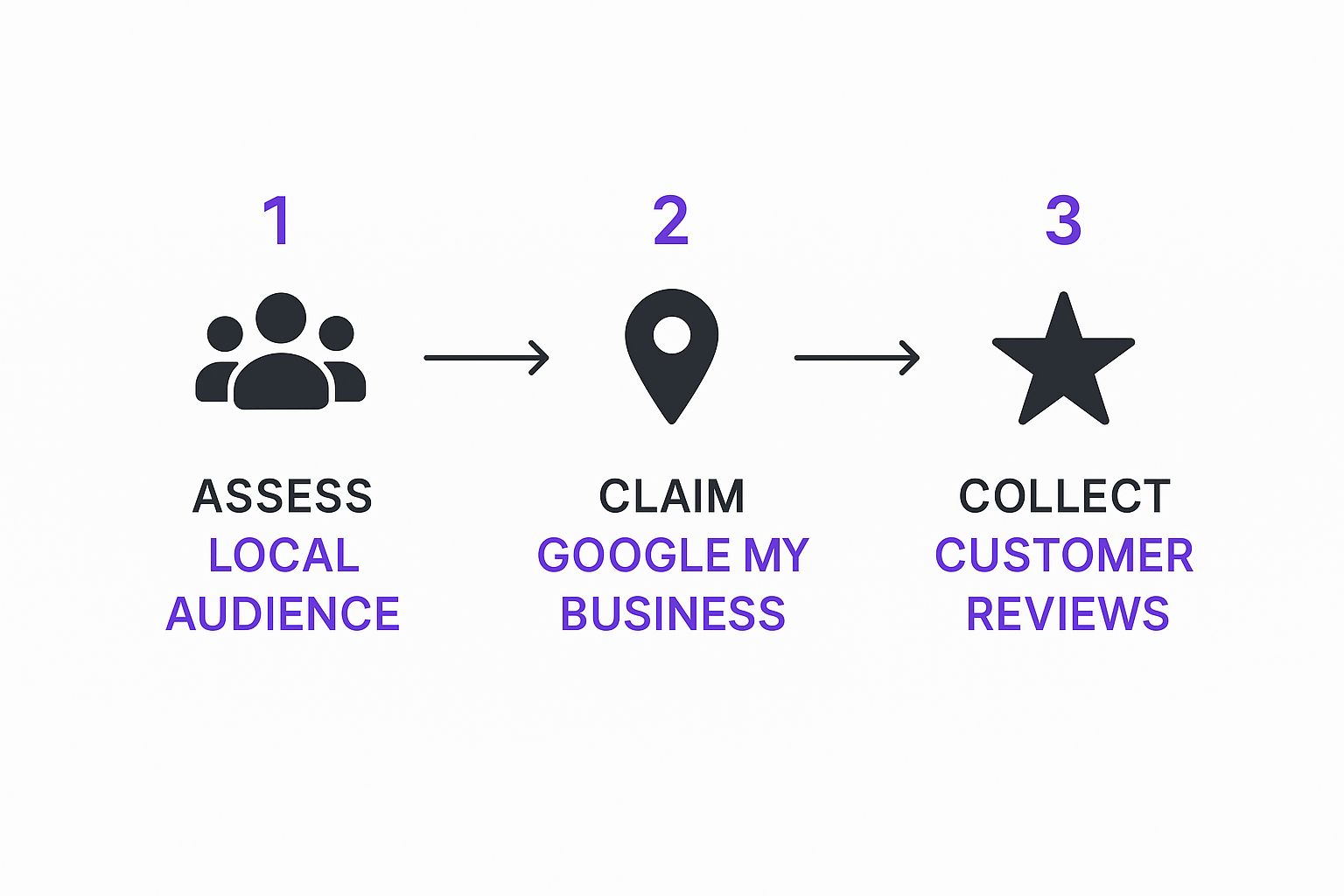
As the visual shows, understanding your audience, claiming your digital turf, and encouraging feedback are the pillars of a winning strategy.
Google looks at tons of factors for local rankings, and GBP signals alone influence 32% of local pack rankings. The primary business category is the single biggest factor in that, which really drives home how vital correct categorisation is. On top of that, with 90% of marketers agreeing that customer reviews affect rankings, it's crystal clear that managing your feedback is essential.
To really make your online reputation shine and show off that authentic feedback, it's worth exploring the benefits of integrating Google Reviews embed directly onto your franchise's webpage.
GBP Optimisation Checklist for Franchisees
Getting each franchise location's Google Business Profile right is crucial for standing out in local search. Here's a straightforward checklist to ensure every profile is pulling its weight and attracting local customers.
| Optimisation Area | Action Required | Why It Matters for Franchisees |
|---|---|---|
| Business Information | Ensure NAP (Name, Address, Phone) is 100% consistent with your website and other listings. Set precise service areas and hours. | Inconsistencies confuse Google and customers, hurting your local rankings. Accurate data builds trust. |
| Primary & Secondary Categories | Select the most specific primary category (e.g., "Pizza Restaurant" not "Restaurant"). Add all relevant secondary categories. | This is the #1 factor for ranking in relevant local searches. It directly tells Google what you do. |
| Localised Business Description | Write a unique description for each location, mentioning local landmarks, neighbourhoods, or community ties. | It makes your chain feel like a local spot, not a faceless corporation, which resonates better with the community. |
| Photos & Videos | Regularly upload high-quality, geotagged photos of the storefront, interior, products, and team. Add a 360° virtual tour. | Visuals significantly increase engagement. Geotagging provides another strong local signal to Google. |
| Reviews Management | Respond to all reviews (positive and negative) promptly and professionally. Encourage new reviews from happy customers. | High review ratings and active responses are a massive ranking factor and build social proof for new customers. |
| Google Posts | Publish Posts at least once a week with local offers, events, or news specific to that franchise location. | Keeps the profile fresh and active, signalling to Google that the business is engaged and operational. |
| Q&A Section | Proactively populate the Q&A with common questions and answers. Monitor and answer new questions from users quickly. | Controls the narrative and provides immediate, helpful information to potential customers, reducing friction. |
| Services/Products | Add a detailed list of all services or products offered at that specific location, including descriptions and prices where possible. | Helps you rank for more specific, long-tail searches (e.g., "vegan pizza in Cambridge") and informs customers. |
Following this checklist for every franchise location will create a powerful, consistent, and locally optimised presence across Google, driving more foot traffic and phone calls.
Mastering Reviews and Reputation Management
For any local franchise, online reviews are the new word-of-mouth. Simple as that. They have a direct line to customer trust and your search rankings, acting as a massive signal to both potential customers and Google itself. Having a solid plan for managing this feedback isn't just a nice-to-have; it's fundamental to your local SEO success.
A steady flow of positive, genuine reviews on platforms like Google, Trustpilot, and Yell tells the world your branch is a trusted part of the community. This doesn't mean hassling people. It’s about creating a simple system your location managers can actually use to build a fantastic reputation that reflects well on the whole brand.
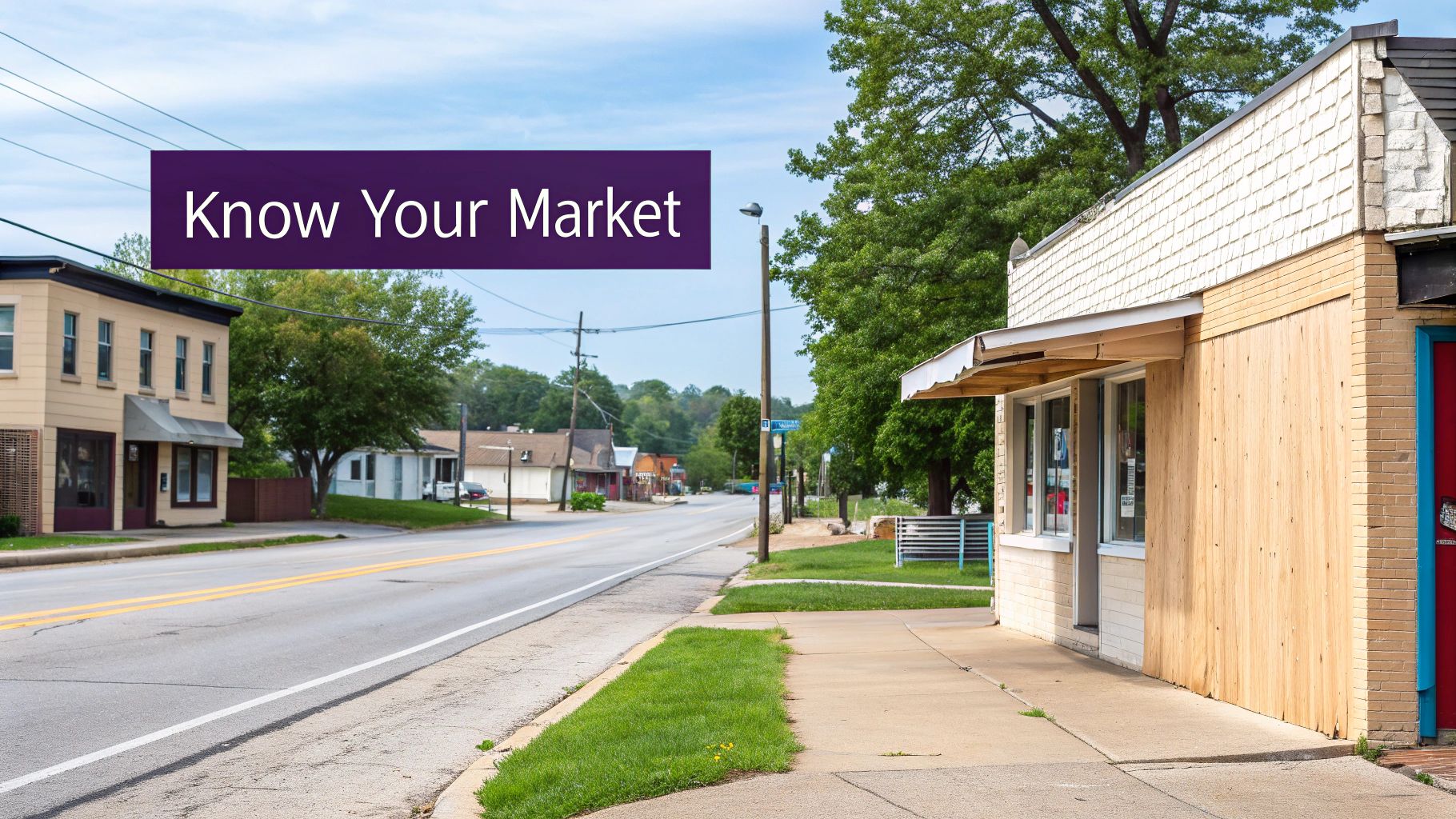
Building a Proactive Review Generation System
Just waiting for reviews to show up is a painfully slow and unreliable way to do things. Instead, franchisees need a simple, repeatable process to gently encourage feedback from happy customers. This isn't about being pushy; it’s about making it dead easy for people who’ve had a great experience to share it.
The perfect time to ask is right after a positive moment—a customer compliments your service, you've finished a job they're thrilled with, or they've just made a repeat purchase. You can train your staff to spot these opportunities.
Here are a few straightforward methods to get the ball rolling:
- Personalised Email or SMS: After a sale, send a quick follow-up message with a direct link to your Google Business Profile review page. Keep it short, sweet, and friendly.
- In-Store Signage: A simple QR code at the till or on a table can send customers straight to the review platform. No fuss.
- Business Cards: Add a small note like, "Enjoyed our service? We'd love to hear about it on Google," along with a QR code or a short URL.
Responding to Every Review The Good and The Bad
Replying to reviews is one of the clearest ways to show you actually care. It tells customers—and Google—that you're an active, engaged business owner. The trick is to respond to all of them, not just the glowing five-star ones.
When you get a positive review, a simple, personalised thank you goes a long way. Try to mention the specific service or product they loved to show you’ve actually read their comment.
Negative reviews, while they can sting, are a golden opportunity. A calm, professional, and helpful reply can often turn a bad situation around and shows other potential customers that you take feedback seriously. Never get defensive. Instead, acknowledge their issue, apologise that their experience fell short, and offer to take the conversation offline to sort it out. It's the most effective way to protect your brand's reputation.
Key Takeaway: Replying to reviews isn't just good customer service; it's a direct ranking signal. Google's algorithm rewards businesses that actively engage with their customers, and prompt responses are a huge green flag.
The Real Impact of Online Reviews
You really can't overstate the importance of a strong local reputation. Here in the UK, a huge 42% of consumers regularly check online reviews when looking up local businesses, with Google being the go-to platform for 81% of them.
Crucially, nearly 37% won't even consider visiting a business unless it has at least a four-star rating. Think about the impact that has on footfall for a franchisee. You can read more about the impact of local reviews on consumer behaviour.
What's more, what happens at a local branch directly shapes how people see the entire franchise. Research shows that 26% of consumers said the online reviews of a local outlet influence their opinion of the main parent brand. This just goes to show how vital reputation management is for every single franchisee hoping to win at local SEO.
For more tips on boosting your visibility, check out our local SEO guide for ranking higher in Cambridgeshire.
Creating Hyperlocal Content That Connects
Let's be blunt: generic, corporate-level content is a complete waste of time for local SEO. If you want real success for your franchisees, you need to create content that genuinely speaks to the specific community each location serves. It’s about proving your business is part of the neighbourhood, not just another faceless chain.
This means ditching the bland, one-size-fits-all messaging. Instead, your focus needs to be on building a hyperlocal content strategy that feels authentic and deeply woven into the fabric of local life. You have to show, not just tell, that your franchise belongs.
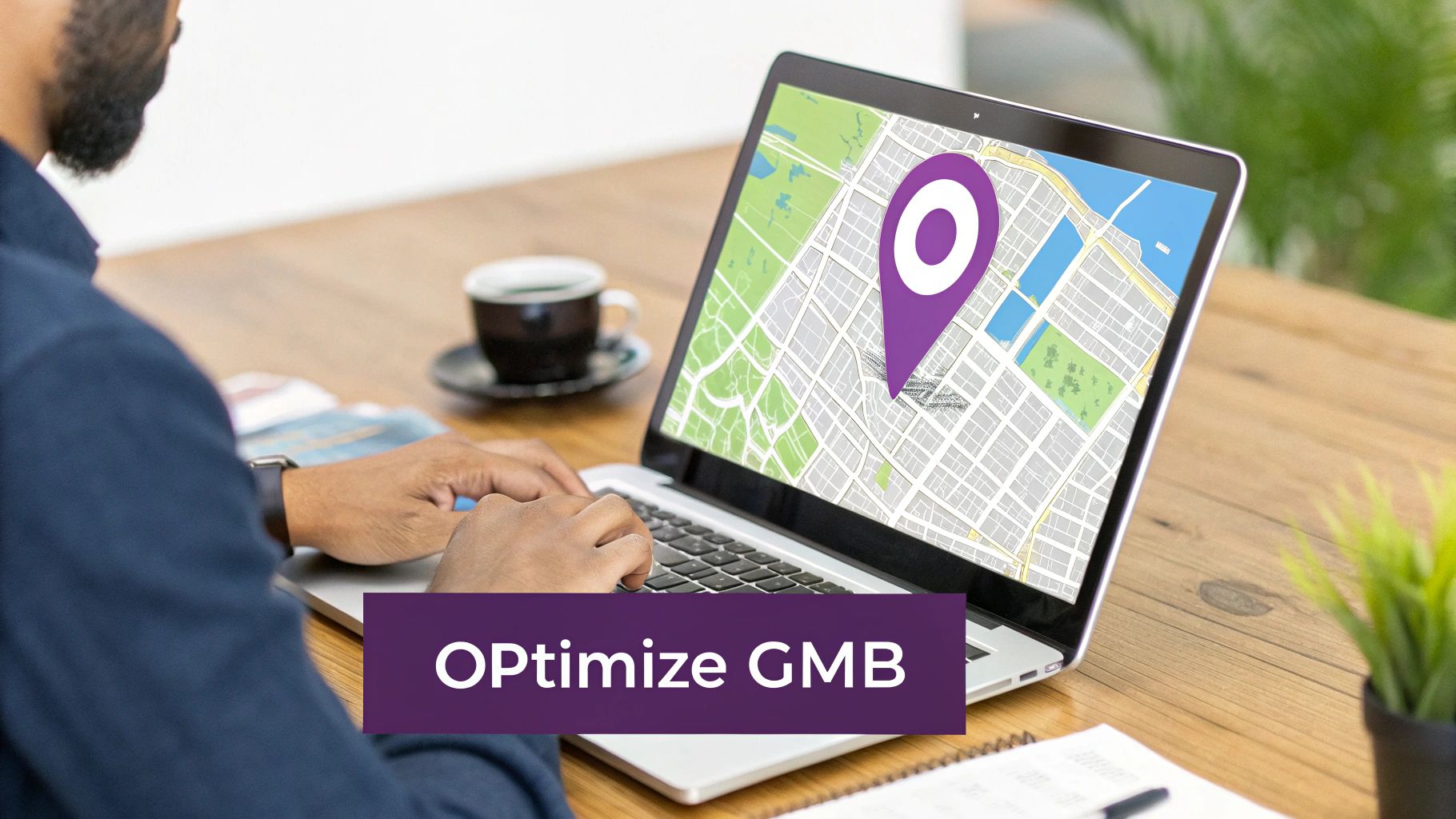
Crafting Dedicated Location Pages That Convert
One of the most powerful tools in your local SEO arsenal is a unique, optimised landing page for each physical location, housed on the main corporate website. These pages need to function as digital hubs for their specific communities.
Think about it. A customer in Bristol couldn’t care less about a special offer running in your Edinburgh branch. Your location pages must cater directly to what's happening right outside their front door.
To make these pages truly effective, they must be dripping with local flavour.
- Introduce the Local Team: Put a face to the name. Feature photos and short bios of the franchisee and key staff. This simple step instantly builds trust and makes the business feel more like a friendly neighbour.
- Showcase Local Landmarks: Include high-quality photos of your storefront with recognisable local scenery in the background. Mentioning nearby parks, famous streets, or community centres in the text adds a powerful layer of local context.
- Highlight Community Involvement: This is where you can really stand out. If your franchise is active in local life—sponsoring events, charity work—this is the perfect place to shout about it.
Going Beyond Your Four Walls With Blog Content
Your content shouldn't stop at your own front door. A blog is a fantastic way to embed your franchise directly into the local conversation. This can be on the main corporate site with location-specific tags or a dedicated section on the location page itself.
The trick is to write about things your local audience actually cares about. It’s not about the hard sell; it’s about becoming a genuinely valuable local resource.
Your goal is to become synonymous with the local area. When people think of your neighbourhood, your franchise's name should be part of that mental map because you're actively contributing to the community conversation.
For example, a fitness franchise in Cambridge could publish a post titled, "The 5 Best Running Routes Near Our Cambridge Gym." This provides real value to local runners and naturally positions the franchise as the go-to expert for health in the area. It’s a brilliant strategy for ranking for local keywords while building incredible brand loyalty.
Practical Ideas for Hyperlocal Blog Posts
- Sponsorship Stories: Did you sponsor the local youth football club? Write a post celebrating their season, complete with photos of the team rocking their new kits.
- Neighbourhood Guides: Create a guide to "The Best Coffee Shops in Leith" or "A Family-Friendly Weekend in the Northern Quarter." This positions your business as a proud local champion.
- Event Participation: If you had a stall at a local summer fete or Christmas market, write a recap. Share photos and give a heartfelt thank you to the organisers and everyone who stopped by.
Tapping Into Localised Video Content
Video is an incredibly potent medium for storytelling and connection. For franchisees, localised video proves—in a way text and photos can't—that you are a real, tangible part of the community.
These don't need to be Hollywood productions. In fact, a more raw, authentic feel often performs much better. A smartphone and a steady hand are often all you need to get started.
Think about creating short, shareable videos like interviews with the franchisee, where they talk about why they love serving their specific town. Or a quick "behind-the-scenes" tour of the premises to make the business feel more transparent and welcoming. These videos are perfect for sharing on your Google Business Profile, location pages, and local social media channels, boosting your local SEO for franchisees and strengthening those all-important community ties.
Building Local Authority with Citations and Links
Think of the internet as a massive, bustling town square. For your franchise to be seen as a legitimate local business, other respected voices in town need to vouch for you. In local SEO, these "votes of confidence" come in the form of citations and backlinks.
Your Google Business Profile is your digital shopfront, no doubt. But it's the citations and links that act as the signposts and word-of-mouth referrals guiding customers right to your door. Getting this right is a surprisingly powerful way to cement your spot in local search and build genuine community trust.
This isn't just a technical box-ticking exercise. It's about weaving your franchise into the local digital fabric, proving to Google and potential customers that you're a real, relevant part of the neighbourhood.
The Foundation of Trust: Citations and NAP Consistency
A local citation is simply any online mention of your franchise's Name, Address, and Phone number (NAP). You'll find them on local business directories, industry-specific sites, and community forums. For any franchisee, they're a foundational piece of the local SEO puzzle.
The absolute golden rule here? 100% consistency.
Every single citation must have the exact same NAP details. Even a tiny variation—like using "St." instead of "Street" or a slightly different business name—can muddy the waters for search engines and dilute your authority.
For franchises in the UK, this means your details have to be perfectly aligned across key directories like:
- Yell: Still one of the UK's most recognised business directories.
- Thomson Local: A long-standing and trusted source for local business info.
- The Independent Business Directory: A popular platform for SMEs.
- Your own website and GBP: These have to be the ultimate source of truth.
Consistency is king. Inaccurate or conflicting NAP information is a major red flag for Google. It chips away at your business's trustworthiness, which can directly torpedo your chances of ranking in the local map pack.
A crucial first step is to audit and clean up your existing citations. You need to hunt down and fix any inconsistencies to build a solid, reliable foundation. Managing this manually is a real grind, but thankfully, there are some brilliant platforms that can simplify the process. To get a handle on this, it's worth exploring some of the best local SEO tools in 2023, as many can automate citation management.
Earning Powerful Local Links
While citations are all about consistency, local link building is about earning genuine endorsements from other relevant websites in your patch. A backlink from a respected local source is miles more powerful than a simple directory listing. It tells Google that your franchise isn’t just listed; it's recommended by the community.
This has nothing to do with spammy, old-school tactics. It's about real-world relationship building that pays off with online authority.
Creative Link Building Strategies for Franchisees
The best local link building strategies are just good marketing activities that happen to have a brilliant SEO side effect. They’re all rooted in genuine community engagement.
-
Sponsor a Local Event: Getting involved with a local charity fun run, a school fete, or a neighbourhood festival is a fantastic way to earn links. Organisers nearly always link back to their sponsors from the event page—a perfect, highly relevant local signal for Google.
-
Partner with Neighbouring Businesses: Team up with a non-competing business just down the road for a joint promotion. A coffee shop franchise could offer a discount to customers of the local bookshop, and vice versa. This can easily lead to a blog post or a mention on their website with a link back to yours.
-
Offer a Local Discount: Providing a special offer for students at the nearby university or staff at the local hospital is a great community initiative. Reach out to these institutions; they’re often happy to list your discount on their student or staff benefits page, complete with a link.
-
Host a Free Workshop or Event: A local accountancy franchise could host a free "Tax Tips for Small Businesses" workshop. This provides real value to the community and gives local business bloggers and community news sites a genuine reason to write about you and link to your event page.
Each of these actions creates a story and a reason for another local entity to acknowledge your franchise online. It’s this authentic, earned authority that truly moves the needle in competitive local markets.
Winning with On-Page SEO for Franchise Locations
One of the biggest—and most frequently missed—opportunities in franchise SEO is properly optimising the main corporate website for each individual location. While Google Business Profiles and local citations are essential, your website's location pages are where you really control the narrative and turn visitors into customers.
Think of these pages as powerful ranking assets just waiting to be unlocked. Effective on-page SEO is all about structuring them to be hyper-relevant to their local community. This goes way beyond just listing an address; you're creating a digital experience that feels genuinely local, signalling to both users and search engines that this branch is part of the neighbourhood.
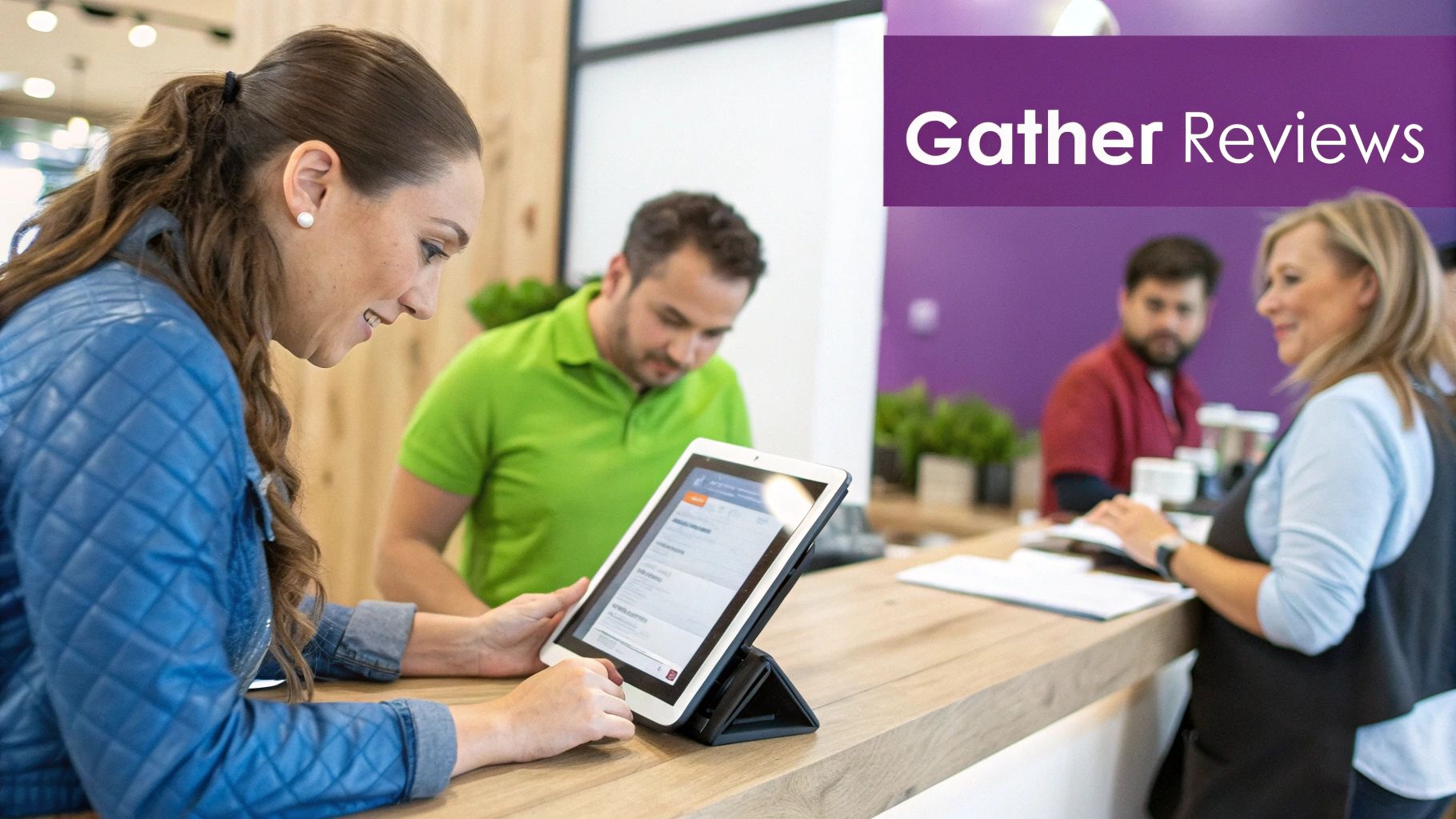
Crafting Localised Page Titles and Meta Descriptions
Let's get straight to it: your page's title tag and meta description are often the first things a potential customer sees in the search results. They need to be compelling and, above all, local. A generic title like "Our Locations" does absolutely nothing for you.
Instead, every franchise page needs its own unique, geographically specific title. For instance, a coffee shop franchisee in Manchester should have a title tag like "Artisan Coffee in Manchester’s Northern Quarter | Brand Name." This immediately tells Google and the searcher exactly what you offer and where.
The meta description should follow suit, acting as a mini-advertisement for that specific spot. Mentioning local landmarks or unique features is a great way to cement your local credentials. For example: "Enjoy freshly roasted coffee and homemade cakes just a stone's throw from Piccadilly Gardens. Visit our Northern Quarter café for the perfect local brew."
Essential On-Page Elements for Franchise Pages
To transform a basic address listing into a high-performing local landing page, a few elements are completely non-negotiable. These details provide crucial context for search engines and a much better experience for your visitors.
- Embedded Google Map: Don't just list the address. Embed an interactive Google Map. This makes it incredibly easy for users on mobile to get directions with a single tap.
- Clear Opening Hours: Display your hours of operation prominently. Make sure they're always accurate, especially around public holidays, to avoid frustrating potential customers.
- Local Testimonials: Feature reviews and testimonials from customers who have visited that specific location. This is powerful social proof that builds immediate trust with new local patrons.
Pro Tip: Make sure your NAP (Name, Address, Phone Number) details are displayed identically on the location page and its corresponding Google Business Profile. This consistency is a core signal of trust for search engines.
Implementing Local Business Schema Markup
Schema markup is a bit of code you add to your website that helps search engines better understand your content. For local SEO for franchisees, implementing LocalBusiness schema is an absolute game-changer.
This code explicitly tells Google key details like your address, opening hours, and even price range in a language it can process instantly. While it's invisible to the user on the page, the benefits are huge.
Properly implemented schema can boost your chances of appearing in eye-catching "rich snippets" in search results, like star ratings or event listings. This makes your entry stand out from the competition, which often leads to a much higher click-through rate.
Remember, the importance of local search can't be overstated; approximately 61% of UK consumers use platforms like Google to find new local businesses. To truly master on-page SEO and achieve better visibility, you need to understand the broader strategies for improving search engine rankings. For a deeper dive into foundational techniques, our guide to https://www.bare-digital.com/small-business-local-seo/ offers more actionable advice.
Your Local SEO Questions Answered
Running a local SEO strategy across multiple franchise locations always throws up some tricky questions. Let's tackle the most common challenges franchisees run into, with clear, practical answers to get you moving forward.
How Do We Maintain Brand Consistency?
The best way to handle this is with a hybrid approach—a blend of central control and local freedom. The franchisor should hand over a solid brand toolkit with all the approved logos, messaging guidelines, and content templates. That sets the ground rules.
From there, franchisees get trained and encouraged to create their own hyperlocal content. This could be anything from sharing photos of their team at a local fete to posting about a new partnership with another neighbourhood business. This is where you get to tap into that priceless local knowledge only they have.
To keep everything on-brand, a simple approval workflow for key marketing materials is a good idea. It strikes that perfect balance between corporate consistency and the genuine local feel that customers really connect with.
What Is The First Step For A New Franchisee?
Without a doubt, the single most important first step is to claim and fully optimise the individual Google Business Profile (GBP) for that specific location. This is the absolute foundation of all local search visibility and is where you'll see the biggest initial impact.
The franchisee needs to ensure their Name, Address, and Phone number (NAP) are perfectly accurate and match the details on the main corporate website. After that, they should dive into selecting the most relevant business categories, uploading high-quality, geotagged photos of their premises, and meticulously filling out every single section available.
How Can We Effectively Measure ROI?
Measuring the return on your investment in local SEO means keeping an eye on a few key metrics. This multi-pronged view gives you a clear picture of what’s actually working.
- Google Business Profile Insights: Start here. See how many people requested directions, called your business straight from the listing, or clicked through to your website.
- Google Analytics: Track conversions happening on your specific location pages. This could be anything from contact form submissions and appointment bookings to clicks on your phone number.
- Call Tracking Software: For a more detailed view, use call tracking to attribute phone leads directly back to your local SEO efforts.
A simple but powerful method is to just ask new customers, "How did you hear about us?" This old-school technique is still a fantastic way to connect your digital marketing to real-world sales and understand the customer journey.
Should Each Franchise Have Its Own Social Media?
This really comes down to your franchise model and the resources available at each spot. Separate, active social media accounts can be incredibly powerful for building a community, letting franchisees share daily specials, staff news, or local promotions.
However—and this is a big one—these accounts must be managed consistently and professionally to reflect well on the brand. If franchisees don't have the time or skill to keep up an active presence, it can do more harm than good.
In that case, it's far better to focus their efforts on their GBP and encourage them to contribute local stories and photos to the main corporate social media channels. The corporate account can then tag their specific location, which centralises management while still providing that local touch. Quality and consistency should always be the priority.
While this guide focuses specifically on local SEO, a broader understanding of effective local business marketing strategies can provide a comprehensive approach to achieving greater visibility and growth.
Ready to turn local searches into loyal customers for every one of your franchise locations? At Bare Digital, we specialise in creating bespoke local SEO strategies that deliver measurable results. Request your free SEO Health Check today and discover how we can boost your rankings, traffic, and conversions.

